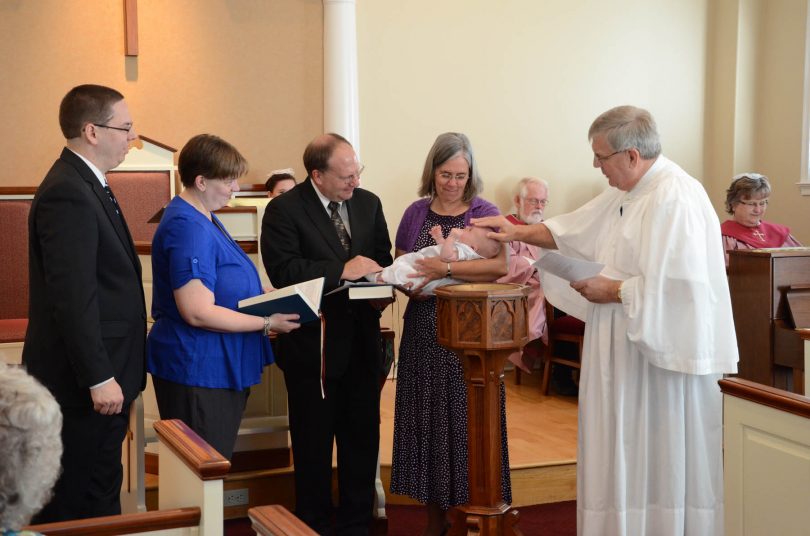Baptism is the sacrament of Christian initiation. Through baptism believers and their children are embodied in the covenant of grace and become a part of the fellowship of the church.
Baptism has a history.
In pre-Christian times converts to Judaism (proselytes) were baptized in a ceremony of cleansing. This rite enabled them to participate ceremonially in the story of their ancestors who passed through the sea and the cloud in the Exodus. (See 1 Corinthians 10:1-2)
John the Baptist offered and administered a baptism of repentance for the forgiveness of sins (Mark 1:4).
Though it was not yet Christian baptism as we know it because “the Holy Spirit was not yet given” (John 7:39), the disciples of Jesus offered and administered water baptism (John 4:2).
In his letter to the Colossians, Paul compares baptism, the sign of the new covenant, with circumcision, the sign of the old (Colossians 2:11-15). Thus most Christians believe that baptism is for adult believers and their children.
Christian baptism has its warrant.
According to Matthew 28:19 Jesus himself commanded that his followers should make disciples of all nations, “baptizing them in the name of the Father, the Son, and the Holy Spirit.” Though some scholars attribute this Trinitarian formula to a later date, it is not unreasonable to believe that Jesus himself instituted baptism in much the same way that he instituted the Holy Communion. At the very least, in submitting to John’s baptism, he provided his followers with an example.
Christian baptism is usually administered at the beginning of the Christian life.
Adults are baptized upon profession of faith after instruction. Children of Christian parents are baptized upon the basis of “the faith of parents and of the church” (Moravian Book of Worship, Liturgy for Baptism, p. 165).
Moravians appreciate the significance of both kinds of baptism: The baptism of an adult who has newly become a Christian reminds us that faith is required of all who are baptized. The baptism of a child – particularly the baptism of an infant – reminds us that God’s love precedes any act of faith on our part.
Christian baptism is administered in three different ways or modes.
When immersion is practiced, the pastor lowers the person being baptized into the water until he or she is completely covered, then raises them up again. When sprinkling is practiced, the pastor dips his or her fingers into the baptismal font or bowl, then sprinkles water upon the head of the person being baptized. When pouring is practiced, the pastor uses a baptismal bowl or pitcher to pour water upon the head of the person being baptized.
There are three modes, but there is only one baptism (Ephesians 4:5).
From time to time, Moravians have employed all three modes of baptism. In the United States, our churches and pastors practice sprinkling or pouring. But an African pastor may baptize a husband and wife in a river by immersion, then, taking their child in his arms, the same pastor may baptize the child by sprinkling or pouring.
Moravians recognize the baptisms of all adults and children who were baptized in any Christian church according to the Trinitarian formula regardless of mode. Moravians do not rebaptize persons who have been previously baptized in our own or another denomination as children or adults.
Christian baptism is symbolic.
Baptism by any mode recalls images of washing or cleansing.
Sprinkling recalls Old Testament images of the priest sprinkling the people with the blood of the sacrifice offered to make atonement (at-one-ment) between a holy God and a sinful nation.
Pouring reminds us of God’s promise to pour out God’s Spirit upon all flesh (Joel 2:28; Acts 2:17).
Immersion reminds us that we are joined to Christ in his death and resurrection (Romans 6:11). It conveys the idea of dying to sin and of being raised to new life. The Moravian baptismal formula captures the same imagery:
Into the death of Jesus I baptize you,
in the name of the Father,
and of the Son,
and of the Holy Spirit.
Therefore live, yet not you
But Christ live in you.
Christian baptism is a sign and a seal.
Baptism is God’s gift to the church. It is a sign – a tangible evidence – that God does those things symbolized by the act. The church baptizes with water, but God alone gives the seal of his Holy Spirit (Ephesians 1:13).
Christian baptism depends upon faith.
Adults demonstrate their faith even before baptism.
Both children and adults are called upon to live lives of faith and obedience after baptism. While Moravians believe that baptism is the act of God, we do not believe that it is a magical act that makes our human response to God’s initiative unnecessary.
Christian baptism carries a responsibility.
Adults who are baptized are called upon to take up the duties of church membership, such as prayer, reading the Scriptures, regular attendance at worship, frequent communion, a life of personal witness, and a support of the church’s mission through the investment of time, talents, and money.
Parents of baptized children are called upon to raise their children in the fellowship of the church and in the nurture and admonition of the Lord. Their tools will include prayer, instruction, and example.
In the rite of confirmation, persons baptized as children are called upon to confirm their faith and to affirm the covenant with God in which their baptism as infants or children placed them.
Every baptism is for the entire congregation.
Ideally, every service of baptism will include an opportunity for each person who is present to affirm his or her own baptism and all that it means. Likewise, parents of baptized children will want to use every service in which a child is baptized as an opportunity to remind their own children that they too have been given to God in baptism.
Baptism is for a lifetime.
Baptism is the sacrament of initiation. The actual ritual is over in a matter of minutes, but the blessings and responsibilities of the act last a lifetime. Every baptism is a call for the whole company of those who have been baptized to be “dead to sin and alive to God in Christ Jesus” (Romans 6:11).
From the Moravian Church Brochure “The Rite of Baptism,” 2010



